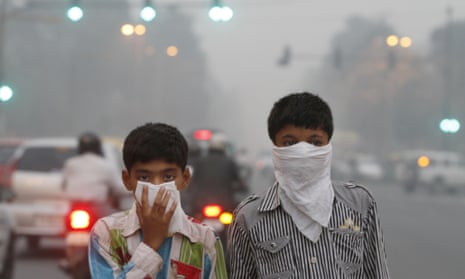A landmark climate change conference in Paris this December has triggered commitments on carbon emissions curbs from most of the world’s major polluters – but those pledges will still not be enough to bring about the reductions scientists say are necessary.
A new report published on Tuesday shows that the remainder of the needed reductions in carbon can be found if actions are taken at a local level, deforestation is halted, and other greenhouse gases are tackled.
The New Climate Economy, a group of experts and academics, said that if its recommendations were followed, between nearly two-thirds and 96% of the extra carbon cuts needed to avoid dangerous global warming could be found.
“We can achieve economic growth and close the dangerous emissions gap,” said Felipe Calderón, chair of the group, and the former president of Mexico who oversaw the crucial UN climate meeting at Cancun in 2010, where current pledges on emissions by world governments up to 2020 were formalised.
He said: “The low-carbon economy is already emerging, but governments, cities, businesses and investors need to work much more closely together to take advantage of recent developments, if opportunities are to be seized.”
More than 40 countries, including the US, China and the EU, have submitted pledges to the UN for limits on their greenhouse gas emissions beyond 2020, when current commitments run out. These will form the major plank of any agreement in Paris, where governments are meeting to forge a new global deal on emissions curbs beyond 2020.
However, some large economies – including India and Brazil – have yet to submit their pledges. On current forecasts, the pledges that have been so far received and those likely to come forward will not be enough to prevent the world warming by more than 2C, a threshold beyond which scientists warn that global warming is likely to become catastrophic and irreversible.
Chief among the measures the New Climate Economy group advocates is action taken by cities, to reduce carbon output by improving public transport, making public buildings and private housing more energy efficient, and dealing with waste better. These measures are frequently not taken account of in emissions targets set by national governments, showing that more can be done to arrest the growth in carbon dioxide output.
These measures, if taken by cities, could also save money, up to $17tn globally by 2050, the group found.
Cities are already gearing up to take action, with more than 75 of the world’s biggest cities forming the C40 group, under former New York mayor Michael Bloomberg, and pledging to reduce emissions substantially in the next three decades.
Halting deforestation by 2030, and encouraging the restoration of degraded agricultural land, would also help tackle the problem. Rich countries and businesses should provide the funding necessary to enable poor nations to preserve their forests, the report’s authors said.
Tackling industrial gases such as hydrofluorocarbons, which have thousands of times the warming potential of carbon dioxide, should also be a matter of urgency, according to the study.
Global shipping is another area highlighted. Emissions from sea transport are not included in the UN negotiations, and fuel for ships is typically paid for as part of the contract to transport goods, giving ship owners little incentive to pursue greater efficiency for their vessels. If large ships were made more efficient, about $200bn could be saved in fuel costs annually by 2030.
Higher efficiency standards for electrical appliances, lighting and vehicles could produce another £18tn by 2035.
Michael Jacobs, report director for New Climate Economy, told the Guardian that the emissions pledges to be made in Paris should be seen as a floor, not a ceiling, and that governments should meet regularly afterwards to ratchet up their targets. “This is in countries’ economic self-interest, so they should take action,” he said.

Comments (…)
Sign in or create your Guardian account to join the discussion